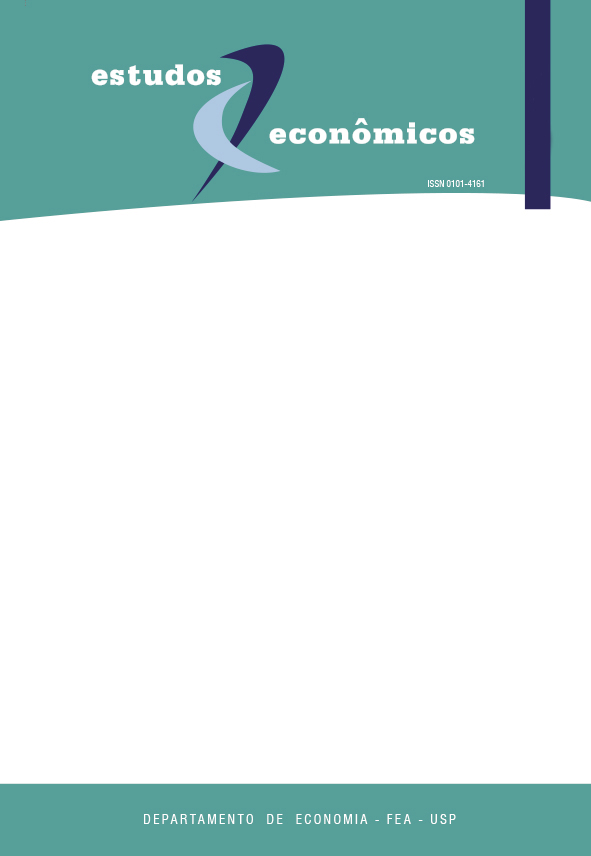Overeducation e undereducation no Brasil: incidência e retornos
DOI:
https://doi.org/10.1590/S0101-41612008000300001Keywords:
overeducation, undereducation, economics of education, BrazilAbstract
The overeducation literature is increasing in developed countries. Several authors have estimated the education-occupation mismatch as well as its effects on individuals' earnings. The objective of this article is to add evidences to this literature, evaluating the incidence and the returns for overeducation and undereducation in Brazil, Regions and São Paulo State. We also focus on gender and occupational differences. Data is taken from Census 2000 and the Brazilian Occupational Titles (CBO) 2002. Regarding regional pattern, the proper-match level has oscillated between 25% and 31%. The level of overeducation was between 14% and 19%. The Southeast region presented the highest tax of proper-match and the South region presented the highest tax of overeducation. The Northeast region presented highest undereducation level (almost 60%). As far as the returns are concerned, the return for women overeducated was 13.9%, while the same rate for men was 12.1%. The return for men overeducated was higher in Center-West (12.7%) and Southeast (12.4%). The women overeducated return was lower in the two most dynamic regions: Southeast and South (13.6% and 12.1%, respectively).Downloads
References
BRASIL. INSTITUTO BRASILEIRO DE GEOGRAFIA E ESTATÍSTICA. Censo, 2000.
BRASIL. MINISTÉRIO DA EDUCAÇÃO. Instituto Nacional de Estudos e Pesquisas Educacionais Anísio Teixeira (INEP).
BRASIL. MINISTÉRIO DO TRABALHO E EMPREGO. Classificação Brasileira das Ocupações de 2002 (livros 1 e 2), 2002.
BÜCHEL, F.; MERTENS, A. Overeducation, undereducation, and the theory of career mobility. Applied Economics, v. 36, n. 8, p. 803-816, 2004.
DUNCAN, G.; HOFFMAN, S.D. The incidence and wage effects of overeducation. Economics of Education Review, v. 1, n. 1, p. 75-86, 1981.
FERREIRA, S.G. The provision of education and its impacts on College Premium in Brazil. Revista Brasileira de Economia, v. 58, n. 2, p. 211-233, 2004.
FUVEST. Manual do Candidato, 2000.
Green , F.; Mcintosh , S.; Vignoles , A. The utilization of education and skills: evidence from Britain. Manchester School, v. 70 n.6, p. 792-811, 2002.
GROOT, W.; MAASSEN VAN DEN BRINK, H. Overeducation in the labor market: a meta-analysis. Economics of Education Review, v. 19, n. 2, p. 149-158, 2000.
HARTOG, J. Over-education and earnings: where are we, where should we go? Economics of Education Review, v. 19, n. 2, p. 131-147, 2000.
MCGUINNESS, S. Overeducation in the Labour Market. Journal of Economic Surveys, v. 20, n. 3, p. 387-418, 2006.
MCGUINNESS, S; Bennett , J. Overeducation in the graduate labour market: a quantile regression approach. Economics of Education Review, 2006. In press.
MINCER, J. Schooling, experience, and wages. New York: National Bureau of Economic Research, 1974.
QUINN, M.A.; RUBB, S. Mexico’s labor market: the importance of education-occupation matching on wages and productivity in developing countries. Economics of Education Review, v. 25, n. 2, p. 147-156, 2006.
RUBB, S. Overeducaton in the labour market: a comment and re-analysis of a meta-analysis. Economics of Education Review, v. 22, n. 6, p. 621–629, 2003.
RUBB, S. Overeducation, undereducation, and the theory of career mobility: a comment and a note on underemployment. Applied Economics Letters, v. 12, n. 2, p. 115-118, 2005.
RUMBERGER, R.W. The impact of surplus schooling on productivity and earnings. Journal of Human Resources, v. 22, n. 1, p. 24-50, 1987.
SANTOS, A.M. Overeducation no mercado de trabalho brasileiro. Revista Brasileira de Economia de Empresas, v. 2, n. 2, p. 1-22, 2002.
SCHWARTZMAN, S. Equity, quality and relevance in higher education in Brazil. Anais da Academia Brasileira de Ciências, v. 76, n. 1, p. 173-188, 2004.
SICHERMAN, N. Overeducation in the labor market. Journal of Labor Economics,
Downloads
Published
Issue
Section
License
Copyright (c) 2008 Maria Dolores Montoya Diaz, Luciano Machado

This work is licensed under a Creative Commons Attribution-NonCommercial 4.0 International License.
By submitting an article, the author authorizes its publication and attests that it has not been submitted to any other journal. The original article is considered final. Articles selected for publication are proofread for grammatical and orthographic errors. The journal does not pay rights for published articles. The Institute of Economic Research from the School of Economics, Business and Accounting of the University of São Paulo (Instituto de Pesquisas Econômicas da Faculdade de Economia, Administração e Contabilidade da Universidade de São Paulo) owns the journal's copyright.




